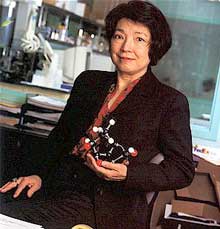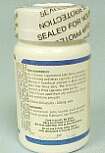Dr. Sophie Chen Pleads No Contest, Company Pays More Than Half Million Dollars For Lacing Supplements

December 19, 2003. Sophie Chen, a Ph.D. biochemist who quit a secure job with a pharmaceutical company in the 1990s to market patent herbal remedies, pleaded no contest on December 18 in California Superior Court, Orange County to a criminal misdemeanor arising out of her company's sales of drug-laced herbal mixtures with names like PC-SPES and SPES as treatments for prostate cancer and other major diseases.
Chen, her brother John Chen (described by one source as a former Tapei fishing-rod salesman) and Allan Wang pleaded no contest to single misdemeanors of advertising misbranded and adulterated food and passing commercial adulterated food.
The Chens, Wang and IMR, Inc have been fined a total of $510 thousand. They now face class action and catastrophic personal injury law suits from prostate cancer patients and others who allege that BotanicLab's bogus herbal supplements caused death, addiction and bodily harm.
The defendants' no contest plea to one misdemeanor was part of a package deal worked out with Orange County assistant District Attorney Byron Nelson. The Chens and Wang faced up to 20 years in prison if convicted on all counts.
Los Angeles Times' reporter Christine Hanley noted Nov 22 that Sophie Chen, John Chen, Allan Wang and their company International Medical Research, Inc. (IMR) doing business in Brea, CA as BotanicLab, were charged on seven felony and seven misdemeanor counts.
The charges alleged that the BotanicLab trio "conspired to doctor a variety of pills with drugs - such as the anti-anxiety medication Xanax - and falsely promote them as cancer remedies to unsuspecting consumers," Hanley said.
In yesterday's plea bargain the trio pleaded no contest to a single felony -- actual knowledge of "serious concealed danger." After FDA tests proved that PC-SPES and other BotanicLab products were spiked with warfarin, Xanax and other prescription drugs, Chen and her associates knowingly failed to inform public authorities of a hazard carrying "imminent risk of great bodily harm or death."
Penal Code section 387 (the California Corporate Criminal Liability Act of 1989) requires businesses to provide public authorities with prompt notice of concealed dangers in products so that the public will be made aware. Companies are required to make this notification within 15 days after the actual knowledge is acquired, or if there is imminent risk of great bodily harm or death, immediately. After the Federal Drug Administration notified BotanicLab on Jan 20, 2002 of dangerous hazards concealed in their products, the company sat on this information and denied it on their website.
Sophie Chen told PSA Rising July 14 2001 that all her products were pure herbs and, if not, any "contamination" occurred in China beyond the reach of her quality control measures.
But in January 2002 California health officials found the anti-anxiety drug Xanax (alprazolam) in SPES, a supplement labeled and sold as a pure herbal mixture. They found the blood-thinner Coumadin (warfarin) in PC-SPES. Other drugs hidden in BotanicLab's "herbal" products include the pain killer Indomethacin and two estrogens, estradiol and DES (diethylstilbestrol), which is banned in the USA as a cancer-causing agent.
Chen and her associates will stay out of jail on the misdemeanor unless they violate an Orange County civil court injunction that bars Chen from the manufacture and sale sentence of one year.
Arcadia attorney Ron Gottschalk told one of our reporters that IMR's no contest plea may benefit patients who are suing Chen and the other defendants."IMR and the defendants will no longer be able to contend that her products (including PC-SPES, SPES and RA-SPES) were not laced and spiked with pharmaceuticals," he said.
"If we get a summary judgment on liability in the class action case," Gottschalk said, "the prostate cancer patients who took PC SPES will be pleased." "Although I don't like the fact that she will walk," he said, "she's barred from manufacturing, promoting or selling PC-SPES or any dietary supplement in California or to California residents." Other states can take similar action and so can the federal authorities, he said. Health Canada and other countries that have banned PC-SPES can take similar action.
Chen has research facilities at New York Medical College, Valhalla, so she may go on doing "research" in New York and feeding it to other companies. "The question is," Gottschalk said, " why would they want to continue the fraudulent research with knowledge that it was the prescription drugs that made the supplements effective?"
Some of Sophie Chen's research has been paid for by taxpayers' money from the Department of Defense, National Institutes of Health and National Cancer Institute. Chen secured "'seed" grants from biotech investor and prostate cancer survivor/advocate Michael Milken's organization, formerly known as CaP CURE.
In 2001 The National Center for Complementary and Alternative Medicine, part of the National Institutes of Health (NIH), granted $8 million to The Johns Hopkins University in Baltimore, the leading recipient of federal research dollars, to study PC-SPES and other alternative cancer therapies. This study never took place.
Sterling Greenwood is a journalist and publisher of Aspen Free Press, Aspen, Colorado. He is a prostate cancer survivor.

DISCLAIMER Jacqueline Strax is a journalist and publisher of psa-rising.com She began covering the PC SPES story while her husband, Norman Strax Ph.D. (1935-2001) was a prostate cancer patient.
General Disclaimer: PSA Rising is designed for informational purposes only and is not engaged in rendering medical advice or professional services. News and information provided through PSA Rising should not be used for diagnosing or treating a health problem or a disease. It is not a substitute for professional care. If you have or suspect you may have a health problem, consult your healthcare provider.


